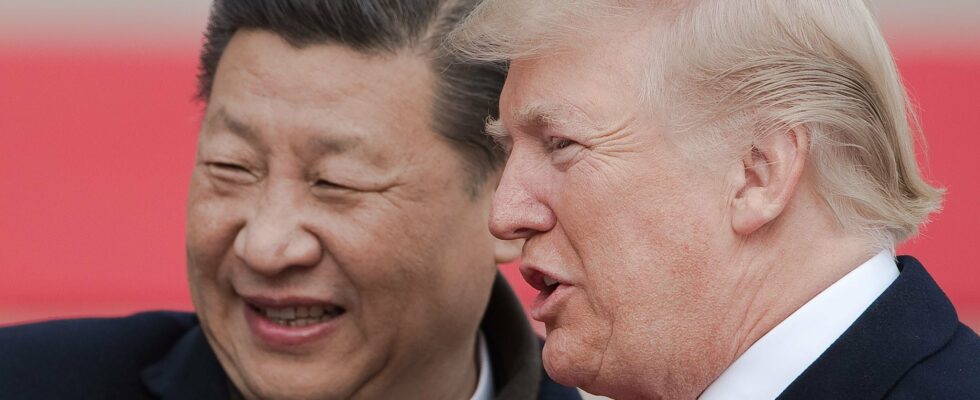During his first term, Donald Trump’s economic policy rhymed with growing trade tensions and a questioning of multilateralism. Eight years later, the president-elect is once again threatening customs duties, which he does not hesitate to describe as “the most beautiful word in the dictionary.” These customs barriers could serve as a lever to obtain trade concessions and provoke a firmer response from China, analyzes Marcus Noland, economist and vice-president of the Peterson Institute for International Economics. In an interview with L’Express, he considers the possible repercussions of this policy for America and the rest of the world.
L’Express: What could the United States’ relations with the European Union, one of its main trading partners, look like given the customs duties that Donald Trump plans to implement?
Marcus Noland: Donald Trump campaigned on the issue of tariffs, almost to the point of obsession. The problem is that he said a lot of different things: first he said he would impose 10% tariffs on all imports, then he increased it to 20%, and he also said that it would impose 60% tariffs on China. Either way, these taxes would have a negative effect on the US economy and the rest of the world. These actions are simply inconsistent with the United States’ WTO obligations. The question is what he will actually do and how other countries will react.
I think he’s going to use them to achieve what he sees as a more equitable economic relationship with Europe. I don’t know exactly what that entails, but he will have a set of demands and the tariffs will be used as leverage. As for potentially affected sectors, steel is still a point of contention, as well as automobiles – Trump was recently complaining about German cars in the US. He will likely want Europe to renounce any form of taxation of American high-tech companies and any antitrust action against American companies.
Mexico is also a key trading partner, but certain statements by Donald Trump have complicated their political relationship. How could this evolve?
The United States and Mexico have no choice but to come to an agreement one way or another, as their economies are so intertwined. However, Donald Trump has threatened to impose tariffs on Mexican trade. His plan to deport undocumented workers would have a negative effect on Mexico, which would have to abruptly absorb all these people. I think this would depress the Mexican economy and cause social upheaval. It would also have a significant impact on the U.S. agricultural sector, where undocumented Mexican workers are heavily concentrated, and could lead to higher U.S. food prices.
So Mexico and the United States will have to find a way to deal with each other. But it could be a rather curious relationship, because Mexicans have just elected a left-wing woman as president.
The free trade treaty between the United States, Canada and Mexico will soon have to be renegotiated, what could happen to this regional partnership?
This treaty will be subject to automatic review in 2026. In principle, the United States could therefore withdraw from this agreement at that time. But I don’t think that’s going to happen. The same thing will likely happen as last time when Trump was president: he will impose demands on Mexico and Canada and use tariffs to put pressure on them. In the end, we could get a revised agreement, which will probably contain some elements that are beneficial and others that are not. Just like after the last revision of the agreement.
The world has already had to deal with Donald Trump’s economic policy for four years. What could be different this time?
The main difference could be China’s response. Last time, China retaliated by imposing tariffs on American products. I think this time the Chinese will be more inclined to pursue a policy of asymmetric retaliation. They can start to make life difficult for American companies that invest in China, like Apple, and that have significant operations in China. They will be more firm.
Last time, after the introduction of these tariffs, the negotiation was supposed to lead to the Chinese buying more products from the United States. Then the pandemic hit. But I think a negotiation is still possible.
What about Southeast Asia, a region that is developing rapidly ?
If the United States imposes high tariffs on Chinese products, Chinese companies will respond by offshoring their production to countries like Vietnam or Indonesia. The region could therefore benefit from disputes between the United States and China. But if this phenomenon gains momentum, it is possible that Trump will try to put in place special rules on trade with these countries to try to stop this kind of “customs evasion” through offshoring.
Furthermore, if the Chinese economy does poorly, it usually affects Southeast Asian countries, as China is their main trading partner. And if China slows down, their export market doesn’t grow.
What could be the repercussions of Trump’s policies on the African continent?
How Trump handles the issue of critical minerals could become an issue. The United States and the world in general are very dependent on China for these critical refined minerals. The most important alternative sources are in Africa, where labor standards, among other things, have given rise to reservations. I think that under Trump, we will not hesitate to source from Congo, for example, and other countries as an alternative to China. Mineral exploitation generally does not generate broad economic development. It can increase national income per capita, but income from these minerals tends to go to a relatively small group of people. This is the case all over the world.
.
